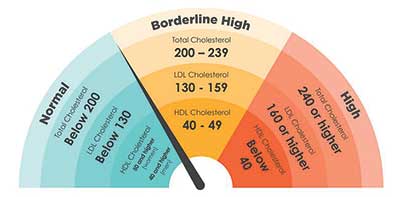 “The answer is yes,” said Dr. Neil J. Stone, professor at Northwestern University’s Feinberg School of Medicine in Chicago.
“The answer is yes,” said Dr. Neil J. Stone, professor at Northwestern University’s Feinberg School of Medicine in Chicago.
Studies show healthy people with LDL levels of 100 mg/dL or below tend to have lower rates of heart disease and stroke, supporting a “lower is better” philosophy, according to cholesterol guidelines issued by the American College of Cardiology and American Heart Association in 2018.
Older recommendations emphasized targeting specific cholesterol numbers. But today, doctors use cholesterol tests as part of a personalized assessment of overall cardiovascular risk. Those with the highest risk have the most to gain from cholesterol-lowering, said Stone. “One has to think about diet and lifestyle and medication to treat the whole risk continuum of blood pressure, cholesterol, blood sugar and weight.”
The guidelines recommend getting cholesterol and other traditional risk factors checked every four to six years starting at age 20. If the COVID-19 pandemic has complicated those plans, get up to date when you can do so safely, said Kristina Petersen, an assistant professor in the department of nutritional sciences at Texas Tech University in Lubbock.
‘GOOD’ CHOLESTEROL VERSUS ‘BAD’
Cholesterol is a waxy substance. It’s not inherently “bad.” In fact, your body needs it to build cells. But too much cholesterol can pose a problem.
When you get your blood tested, you’ll probably see numbers for total cholesterol, LDL cholesterol, HDL cholesterol and triglycerides. LDL is the so-called “bad” cholesterol because it increases the risk of heart disease, stroke and other health problems. HDL is dubbed the good cholesterol because having a higher level is associated with lower risk of heart disease and stroke.
Lowering LDL should be the priority. “The most important thing is to lower LDL cholesterol, because that is what ultimately increases your risk of heart disease,” she said.
Many sources of cholesterol in the diet also are sources of saturated fat, Petersen said. “We do want to limit dietary saturated fat intake. And if you do that, your intake of dietary cholesterol will be low.” Cutting back on saturated fat can improve your LDL number in four to six weeks, she said.
Triglycerides are the most common type of fat in the body. They store excess energy from your diet. A high triglyceride level combined with high LDL (bad) cholesterol or low HDL (good) cholesterol is linked with fatty buildups within the artery walls, which increases the risk of heart attack and stroke.
IS IT OK TO EAT EGGS?
Egg yolks are known for their cholesterol, with one large scrambled egg containing 169 milligrams of cholesterol. “You can eat eggs,” Petersen told the American Heart Association. “We suggest eating no more than one full egg per day in order to keep your cholesterol intake low, but you can definitely have eggs as part of a healthy dietary pattern.”
The research is inconsistent, she said, because eggs often are consumed with foods high in saturated fat, making it hard to parse out potential harm. And people vary, Stone said. “Some patients have two eggs a day, and their cholesterol doesn’t budge. Other patients have two eggs a day and their cholesterol goes up 50 points.”
High LDL cholesterol is sometimes caused by a genetic abnormality called “familial hypercholesterolemia” that affects an estimated one in 212 U.S. adults. If it’s picked up early, medication combined with a healthy diet and exercise can be very effective. American Heart Association guidelines say it’s reasonable to check cholesterol in children as young as two who have a family history of early heart disease or high cholesterol.
GET A CHOLESTEROL TEST
High cholesterol usually has no symptoms. That’s why it’s important to have your doctor check your cholesterol levels.
A simple blood test will shed light on your cholesterol levels and allow you to make informed decisions about your health. It’s best to have your primary care doctor, who knows your health and family history, do the test.
To determine your cardiovascular risk, your doctor will consider your cholesterol test results in context with your age, sex and family history. Other risk factors, such as smoking, diabetes and high blood pressure, will be considered as applicable.


